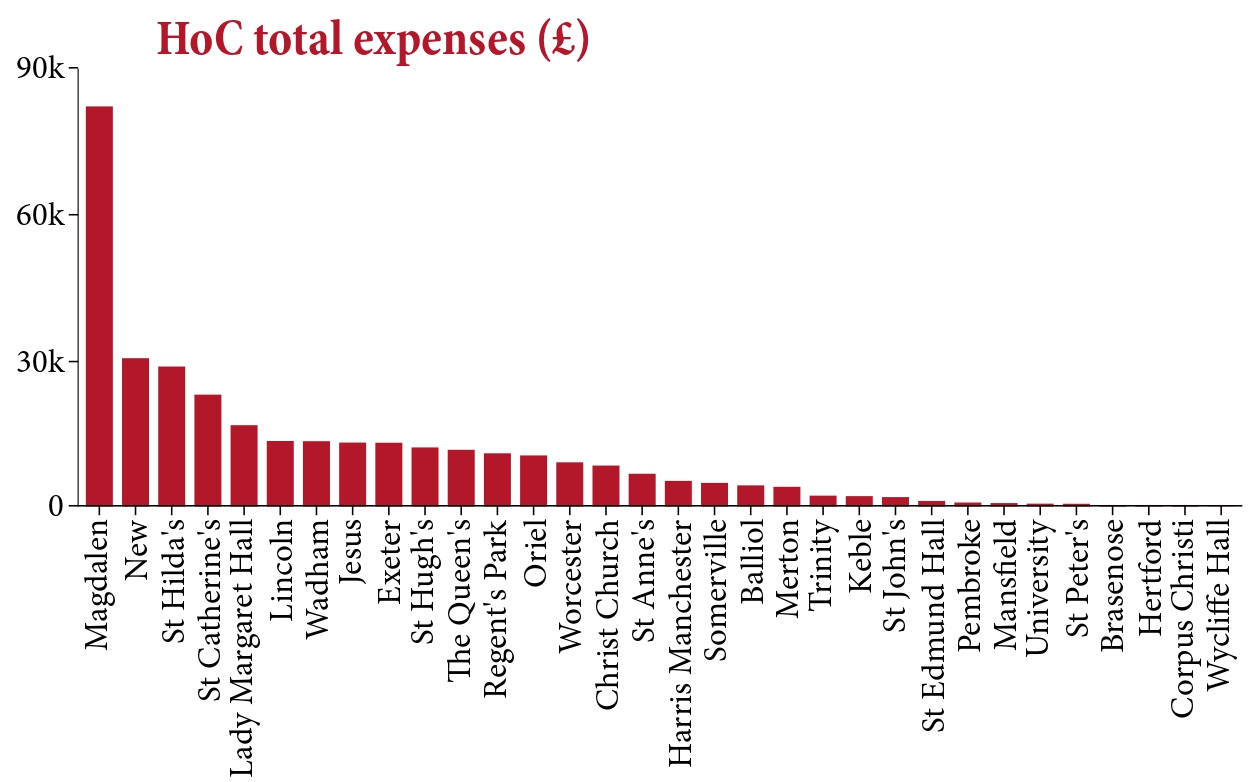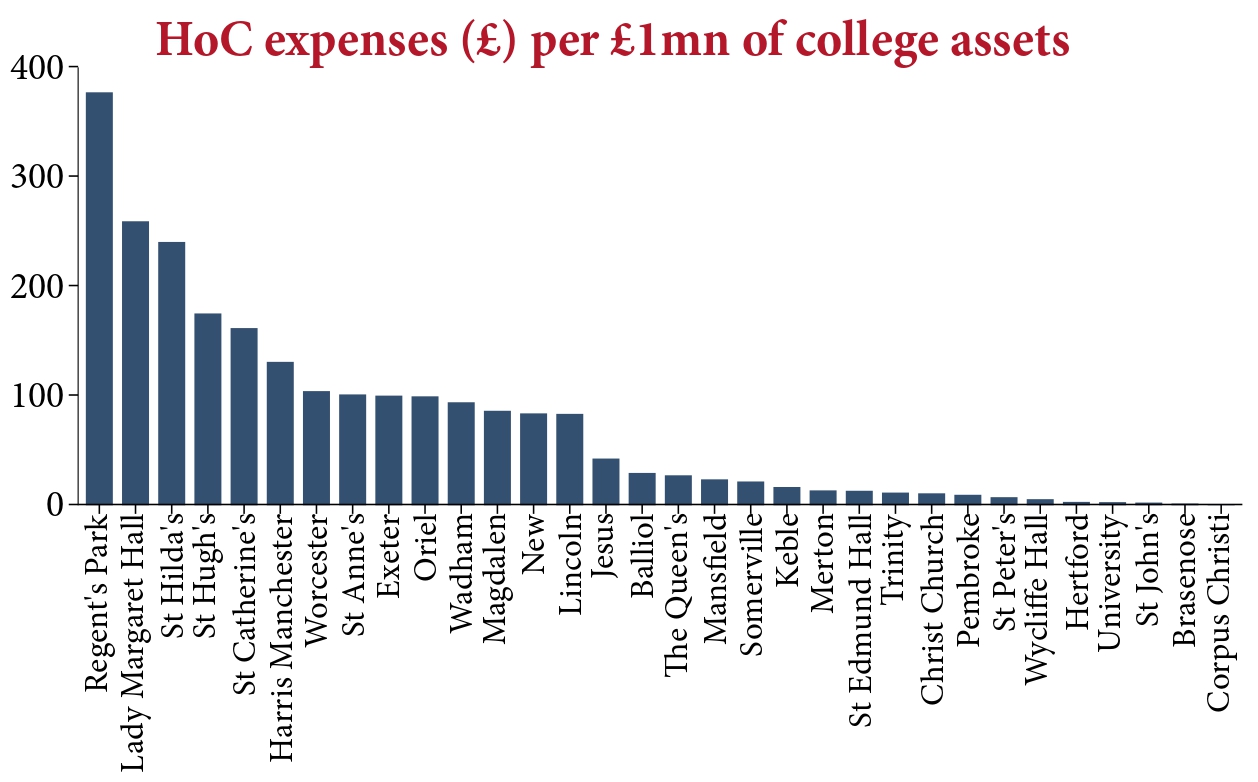Oxford college heads have claimed more than £333k in expenses over the past two years, with some charging tens of thousands for travel, hospitality, and entertainment.
There is currently no standard practice governing how college heads use funds and report spending, and the University declined to answer Cherwell’s questions regarding expense claims.
The data, obtained by Cherwell through Freedom of Information requests, shows that spending patterns differ sharply across the University. While some colleges reported comparatively low totals, others claimed tens of thousands for international travel and hospitality.
The combined expenses total for all undergraduate college heads amounts to £333,530, with the office of Dinah Rose, President of Magdalen College, accounting for nearly a quarter that total.
Rose’s office claimed £82,239, more than any other college, and more than double the £30,496 claimed by the runner-up, New College, which can be seen on the graph below.
Magdalen did not provide a detailed breakdown of expenses, claiming that it constitutes “personal data” despite the figure constituting the spending of an office rather than an individual, for duties carried out in official college capacity. Other colleges did, however, provide itemised lists of expenses, including the names of hotels and restaurants to the penny.

International trips are among the most common expenses, particularly to Hong Kong. The Warden of New College, for example, claimed over £10,000 for a visit there. A spokesperson noted that such trips can generate significant fundraising returns, with recent donations from Hong Kong alone amounting to more than £30 million.
On a similar visit to Singapore and Hong Kong, Stephen Blythe, Principal of LMH, stayed at the 5-star Clan Hotel, and later charged a “champagne event” in New York to the expenses account, as well as a £600 afternoon tea with prospective donors.
A spokesperson for LMH told Cherwell that over the past three years, over £15 million has been raised for the College, and that “fundraising expenses incurred in the course of this work are approved and reimbursed in accordance with College policies”.
Colleges function as independent charities, relying on their endowments and donations to fund operations. Unlike the central University, colleges are financially autonomous, making fundraising a key part of the job for a head of college. For example, this year Pembroke College announced a fundraising goal of £100 million in order to fund fellowships, a new library, renovations, and outreach efforts.
Other records, however, show funds from different colleges being used for activities linked to external organisations.
In June 2023, Clair Craig, then-Provost of Queen’s College, charged £824 for “wine, prosecco and soft drinks” at an event for INGSA, a science advisory network, and a further £80 at a Mayfair lounge for the organisation. The college also covered £1,937 for Craig’s flights and accommodation to attend the World Science Forum with INGSA in Budapest.
Her expenses also include spending on furnishings, from £282 on flowers to over £300 on photo frames, as well as food bills including £25 at Gail’s, £29 at Hotel Chocolat, and £11 on crisps.
Responding to these claims, a spokesperson for Queen’s told Cherwell that “the expenditure either directly advances or supports the College’s charitable purposes.” However, they did not respond to questions over expenses related to INGSA.
Other data shows that Nigel Clifford, Rector of Lincoln College, managed to spend £79 in Wagamama at Heathrow Airport on a meal for three. Clifford also charged the College over £276 for a chauffeur service to Heathrow.
The company claims to provide “luxury” cars to the House of Lords, Whitehall, Government Offices, and importantly, Oxford University. A Lincoln College spokesperson told Cherwell that the chauffeur service was “the most practical and economical” means of transport.
Colleges often defend expenses as part of their fundraising and alumni relations efforts, which they argue bring in donations that benefit students and college life. For example, Miles Young, Warden of New College, had the second highest expenses tab of the surveyed college heads, though over £3000 went towards the College’s choir tour, and over £400 for a Chinese New Year event for students.
However, the disparity in claims raises questions about the transparency of college finances in an unstandardised collegiate system. A spokesperson for Magdalen even pointed out that if New College and Magdalen were excluded, the average expense claim would “not appear to be sufficient to accommodate the travel, hospitality, and entertainment that would normally be expected” of a head of house.
New College, for example, told Cherwell that their policy includes one trip to the USA per year, which is “necessary to attend the annual Board Meeting and associated events of the American Friends of New College”. There is an additional trip every three years to meet alumni and donors in Asia, including Hong Kong and Singapore, for fundraising and college events.
By contrast, the head of Wycliffe Hall reported the lowest expenses of any college head, spending just £52 over two years. The Principal of Hertford College spent £245 over the same period, while Brasenose’s President spent a similar £280 on expenses.
The University has an expense policy for work undertaken in the course of University business, though individual colleges have their own autonomous policies due to their status as independent self-governing charities. Cherwell understands that the University has no official duty under charity law to monitor spending by colleges.
This autonomy applies to how expenses are recorded, with no standardised system governing how colleges track spending by college heads. Some colleges may reimburse their head after they pay personally, while others cover costs directly, meaning the same trip could appear differently in separate colleges’ accounts.

The impact of this spending varies drastically when measured against college endowments, which are the invested funds that generate much of colleges’ income. Oxford’s colleges vary enormously in wealth, with some holding endowments worth hundreds of millions while others operate on far smaller budgets.
The College Disparities Report, authored by then-SU President Danial Hussain, highlighted the impact of these stark differences between colleges. For example, in the 4 years prior to the release of the report, Christ Church’s wealth increased by £169 million, larger than the combined endowment growth of the 10 poorest colleges.
Analysis of expense claims against college wealth by Cherwell on the above graph shows a different angle to the scale of these claims. When measuring expenditure this way, Regent’s Park wins by some margin, with the Principal’s £10,947 claim looming larger than that of Magdalen’s £82,239 in expenses.
In fact, when compared to college wealth, Magdalen figure is the twelfth highest, with our runner-up, New College, ranking thirteenth. Despite its eye-watering endowment, the Dean of Christ Church spent only £8,430, making it the ninth lowest figure when compared to the College’s endowment.
Last year, Cherwell revealed that Oxford Vice-Chancellor Irene Tracey had claimed £47,564.97 on expenses since her appointment in January 2023.
The figures show the University covered over £25,000 for her flights and £12,000 on rail and car travel, on top of her baseline salary of £573,000, which includes £100,000 for housing. Tracey is the second-highest paid vice-chancellor in the country, just behind her Cambridge counterpart.
Senior members of Coventry University have recently come under scrutiny from the University and College Union (UCU) for spending around £150,000 on flights, with the vice-chancellor spending £7,870 on one business class flight with Emirates. The Coventry University Group announced in December 2023 that it needed to deliver nearly £100m in cuts over a two-year period.
Though Oxford colleges argue that expense claims are a vital part of fundraising efforts and leading alumni engagement, the wide disparities in these sums of money raises questions about the accountability of the money that colleges spend. Given this inconsistency, it is impossible to effectively compare how money is spent, and unless it is actively sought out, this information is allowed to slip entirely under the radar.


